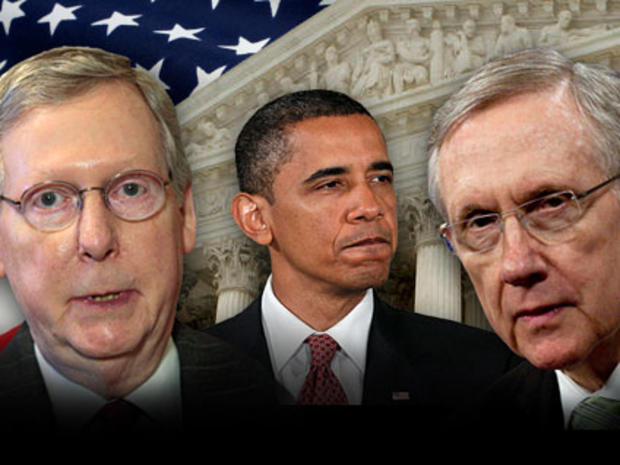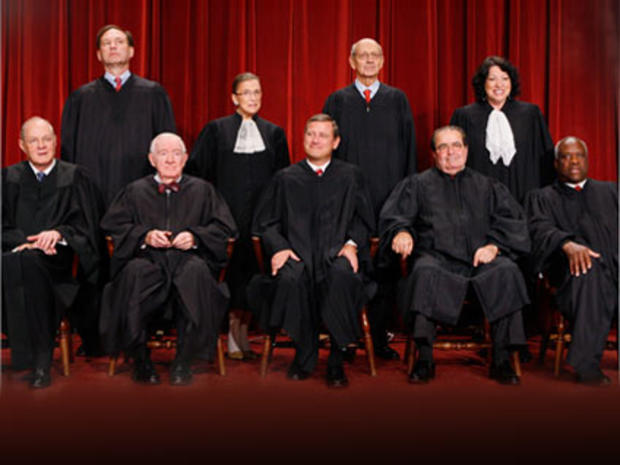The (Possible) Mother of All Battles: What If a Conservative Supreme Court Justice Retires?
This is not a prediction. I don't know how to see into the future, and I've long lamented the besetting journalistic sin of confidently asserting what's going to happen.
So call it a possibility -- one that, should it develop, is going to make the political wars of the recent past look like models of bipartisan civility.
This possibility rests on two assumptions: First, that Republicans will make significant gains in the Senate this November; Second, that between January of next year and Election Day 2012, one of the five conservative Supreme Court justices will leave the court.
The first assumption is a probability; the second, nothing more than a hypothetical. If it becomes reality, start moving the furniture out of the room.
First, some background: since George W. Bush's re-election in 2004, there have been for departures from the Supreme Court bench. In three cases -- and here I'm using an oversimplified yardstick -- there was no real ideological shift. Conservative Chief Justice Rehnquist was replaced by conservative Chief Justice John Roberts; liberal David Souter was replaced by liberal Sonia Sotomayor, and liberal John Paul Stevens will be replaced by liberal Elena Kagan (barring a last-minute hitch).
However, in one case -- the replacement of Sandra Day O'Connor by Samuel Alto -- the change meant a measurable shift to the right -- on issues ranging form corporate campaign spending to gun rights to abortion restrictions.
Now imagine it's 2011, and the Senate has become more Republican than it is now; And imagine that Clarence Thomas or Antonin Scalia -- or Roberts or Alito or even Anthony Kennedy (the "swing justice") -- has to leave the bench.
For conservatives, anyone likely to be picked by President Obama's will represent a dramatic shift on the Court. Why? Because many of the Court's recent controversial decisions -- on gun rights, late-term abortions, corporate campaign spending -- were 5-4 votes. The impact of an Obama-chosen justice replacing a conservative on the Court would be far, far more consequential than Sotomayor for Souter or Kagan for Stevens.
And that means that the confirmation struggle is likely to go "nuclear."
It means that the arguments that arose when George W. Bush was president will be heard again -- but with both sides arguing the opposite of what they espoused five years ago.
Back then, Democrats asserted that a judicial filibuster -- forcing Mr. Bush to gain 60, rather than 51 votes -- was a critical tool to protecting the Court. Republicans said the judicial filibuster had no place in the Senate, and urged Vice President Cheney (the presiding officer) to rule such filibusters out of order. (The conflict was postponed by a bipartisan agreement to shun the device except in rare cases.)
If there is a liberal nominee posed to replace a conservative, we are sure to hear Republicans arguing for the merits of a filibuster, while Democrats attack it as an invalid tactic. We will hear Republicans arguing that ideology is indeed a legitimate ground for voting against a nominee qualified by experience; while Democrats, who once asserted precisely that point, will argue that qualifications and competence are what matters.
We may even hear conservative academics argue, as one prominent liberal law school professor did after the disputed 2000 election, that the Congress should simply leave the position vacant until voters decide in 2012 who should be nominating justices. Indeed, the closer we are to the 2012 election when and if a conservative justice retires, the more intense the political fight will be.
It's worth noting that the only time in recent history that a president did not get a nominee through a Senate controlled by his party was when President Johnson tried to elevate Justice Abe Fortas to Chief Justice in 1968. A coalition of Republicans and conservative Democrats, looking at the strong possibility of a Nixon victory that fall, blocked the confirmation.
The potential for gridlock and conflict becomes even greater if we imagine a Republican takeover of the Senate in November; meaning that the Judiciary Committee, and the Senate calendar, would come under the control of Republicans, In that case, try to imagine what kind of nominee Mr. Obama could get confirmed.
Give up? So do I?


